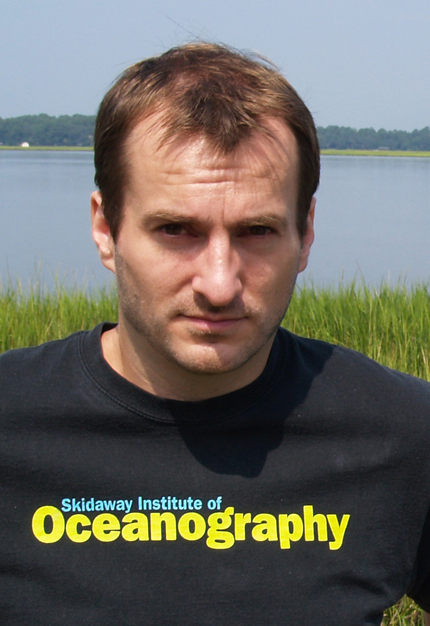 Black carbon, formed from the burning of biomass and fossil fuels, may account for as much as ten percent of the carbon transported by rivers into the ocean and play a significant role in controlling the balance of two of the most important carbon pools on earth – the soil and the ocean.
Black carbon, formed from the burning of biomass and fossil fuels, may account for as much as ten percent of the carbon transported by rivers into the ocean and play a significant role in controlling the balance of two of the most important carbon pools on earth – the soil and the ocean.
This is the finding of a group of scientists, including Aron Stubbins of the Skidaway Institute of Oceanography. This research will appear in the April 19, 2013 issue of the journal Science, published by the AAAS, the science society, the world’s largest general scientific organization. See http://www.sciencemag.org, and also http://www.aaas.org.
Black carbon is organic material that has been altered by heat or combustion, such as the remnants of forest fires or burning fossil fuels. The burning of biomass generates between 40 million and 250 million tons of black carbon every year. Part of that is preserved for thousands of years in soils and sediments where it makes up approximately ten percent of the total carbon there.
Another portion is picked up by drainage and carried by rivers to the ocean. According to Stubbins and his colleagues, as much as ten percent of the carbon dumped by rivers into the ocean may be this black carbon.
This movement of black carbon involves two of the Earth’s three main stores of reactive carbon — in the soil and in the dissolved phase in the ocean. Both are approximately the same size as the third store – the carbon in the atmosphere, in the form of carbon dioxide.
“The balance between those three carbon pools is very important,” said Stubbins. “It controls the levels of carbon dioxide in the atmosphere, which in turn influences local and global climate.”
Black carbon is fairly stable in the marine environment, especially in the deep ocean. However, near the surface black carbon is very photo-sensitive. So when it is exposed to sunlight, it will degrade rapidly.
“In the deep ocean, the degradation is so slow that it would take up to 40 thousand years for the black carbon to be removed,” said Stubbins, “However, stick it in sunlight and 95 percent will disappear in two weeks.”
When exposed to sunlight, the relatively complex black carbon molecules break down into smaller molecules, including carbon dioxide. The CO2 is dissolved in the ocean water where it can be utilized in photosynthesis by microscopic plants called phytoplankton. It can also be released into the atmosphere as part of the constant exchange of gasses between the atmosphere and the water at the ocean surface.
This degradation of black carbon in the surface ocean is apparently happening at a fairly rapid rate. The data in this project suggests that the Earth’s rivers are dumping much more black carbon into the ocean than can be found there.
“So where is it going?” asked Stubbins. “The rivers are dumping ten to 100 times more carbon into the ocean than we are finding there. That means we are losing ten to 99 percent of it.”
Stubbins continued, if that black carbon had remained in the soil, it would have remained stable for thousands of years.
“If you are losing it in the oceans, it is likely being converted into carbon dioxide. This freeing of black carbon from the soils, followed by its conversion to CO2 is analogous to the production of CO2 that occurs when we dig up and burn fossil fuels.”
The Science article is titled “Global Charcoal Mobilization from Soils via Dissolution and Riverine Transport to the Oceans.” The lead author is Rudolf Jaffé from Florida International University. In addition to Stubbins, the co-authors include Yan Ding, also from Florida International University; Jutta Niggemann and Thorsten Dittmar from the Max Planck Research Group for Marine Geochemistry; Anssi V. Vähätalo from the University of Helsinki; Robert G.M. Spencer from the Woods Hole Research Center; and John Campbell from the U.S. Department of Agriculture Forest Service Northern Research Station.
The entire article can be viewed online at: www.sciencemag.org
Stubbins has a website detailing this and other work on black carbon at: https://www.skio.usg.edu/?p=research/chem/biogeochem/blkcarbon
# # # #



Thanks for your personal marvelous posting! I genuinely enjoyed
reading it, you might be a great author.I will be sure to bookmark your blog and
will come back in the foreseeable future. I want to encourage that you continue your
great posts, have a nice holiday weekend!